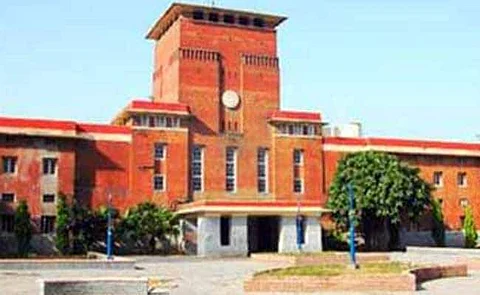

Amid constant protests by teachers, Delhi University has reportedly signed the controversial tripartite Memorandum of Understanding (MoU) with the University Grants Commission (UGC) and the Ministry of Human Resource Development (MHRD) with regard to its funding model. What does this mean for the prestigious varsity? More self-financed students and revenue that will push them towards the vision of the much-panned draft of the National Education Policy (NEP).
The DU Teachers' Association (DUTA) president Rajib Ray said that the DU Vice-Chancellor signing the MoU meekly and without any expression of public concern, has demonstrated that his concern for the university is right at the bottom of his list of priorities. The Delhi University was the last of the central universities to have refused to sign the MoU — others had either caved in or enthusiastically signed to "please the government", said Rajib.
"Delhi University held out for so long due to teachers’ reasoned critique of and opposition to the said MoU as a tool to push universities towards and commercialisation and privatisation of their activities, which are going to adversely affect the character and content of education and research," said Rajib. "The VC had options such as involving the faculty, departments and colleges in a debate over the MoU and representing their considered views on the implications of the MoU to the Government but he chose to please the government that threatens him for the delay in signing and protects him from his wrong-doings as enumerated in the White Paper submitted by the DUTA earlier," added the DUTA president.
But what is the Tripartite MoU all about? "The Union Government bypassed consultations with the academia and brought in through Rule 229 (xi) of the General Financial Rules 2017 a requirement on the part of the MHRD, UGC and each of the Central Universities to ensure that each Central University expands its student intake every year and finances an increasing part of its expenditure," said Rajib. "It requires Central Universities to meet their infrastructural needs, routine as well as on account of enforced expansion, through loans from Higher Education Funding Agency (HEFA) — an instrument created through a budget announcement to push universities toward self-financing," added Rajib.
The Tripartite MoU requires universities to continually increase the ration of internal (self-generated) financial resource to total expenditure through fee hike, shift to revenue earning commercial courses, engagement with other commercial activities and manage greater part of their research activities through extramural funding. "Such steps have a significant impact on the content of courses and direction of research by coercing universities to become dependent on the market," the DUTA President added.
What the Tripartite MoU does, says the DUTA, is initiate steps towards the privatisation design that forms the core of the Draft NEP 2019. "The Draft NEP 2019 aims to reduce the number of HEIs while increasing the size of surviving institutions which all will be governed similarly by a privatised Board of Governors and have to have a Development Office to secure sources of funding other than government funding," said DUTA. "The single-minded coercive steps by the Government to make universities sign the MoU is an indication that the government is keen to push through the core structure of institutional reforms of higher education proposed in the draft," added a statement by the organisation who promised to broaden and intensify its struggle against the NEP as well as instruments of privatisation such as the Tripartite MoU.
